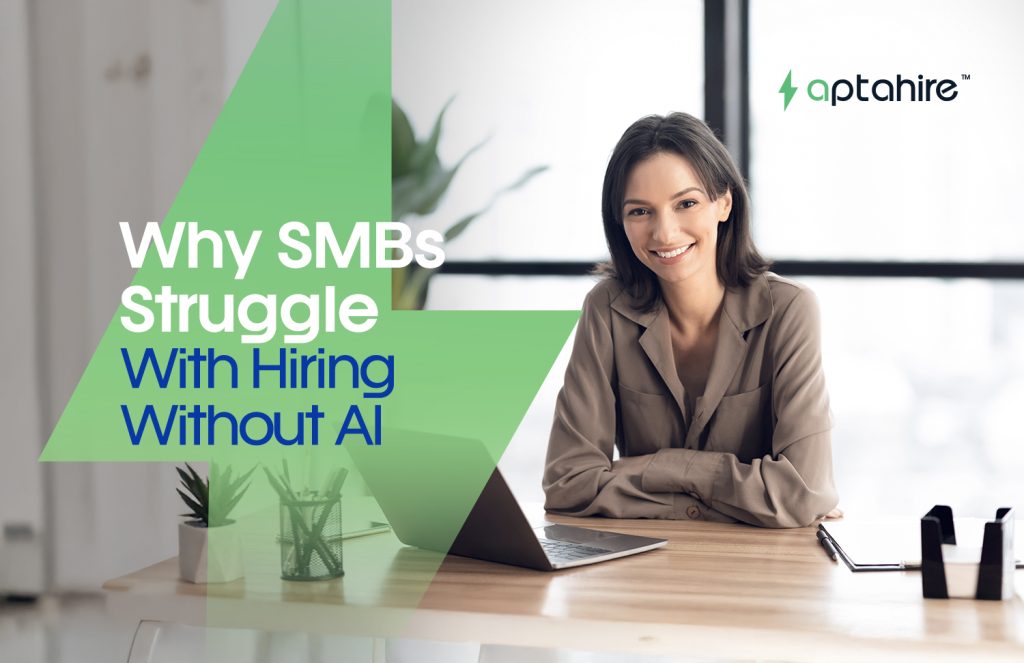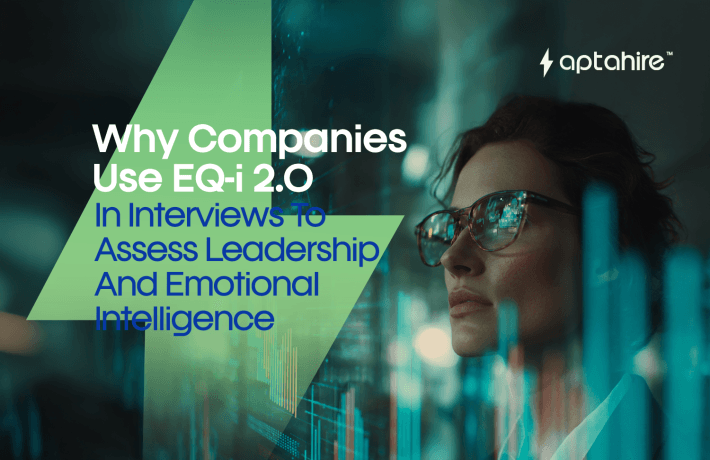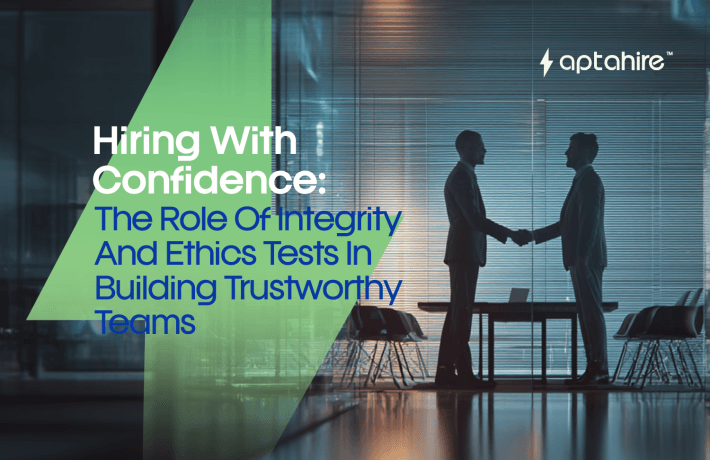Why SMBs Struggle with Hiring Without AI

Hiring has always been a challenge for small and medium-sized businesses (SMBs), but in the age of digital acceleration, that challenge has become more pressing and more complex. With limited resources, high competition, and increasing candidate expectations, SMBs are finding it harder than ever to attract, evaluate, and hire top talent, especially without the help of artificial intelligence (AI). In this in-depth guide, we explore why SMBs struggle with hiring without AI, what they’re losing in the process, and how embracing smart hiring tools can level the playing field.
1. The Reality of Hiring for SMBs
For most SMBs, hiring is not a well-oiled machine. It’s often reactive, manual, and filled with guesswork. Typically, the person responsible for hiring is wearing multiple hats, they might be the founder, operations head, or a lone HR generalist. There is no dedicated team, no structured process, and often, no clear metrics for success.
When a role opens up, the hiring process usually involves:
- Posting on a few free or affordable job boards
- Manually scanning resumes in email inboxes
- Calling or emailing candidates to set up interviews
- Relying on gut feeling to make hiring decisions
This approach might have worked when the talent pool was less competitive and roles were simpler. But in 2025, it’s a recipe for missed opportunities, long hiring cycles, and poor hires. In a world where talent is the ultimate growth lever, outdated recruitment methods are a major disadvantage.
2. Time is a Luxury Most SMBs Don’t Have
One of the most significant drawbacks of manual hiring is how long it takes. Sorting through hundreds of resumes, scheduling interviews over email, coordinating feedback, and making decisions without automation can stretch the hiring process to several weeks, sometimes months.
According to industry reports, the average time-to-hire for SMBs is 36 days, compared to 25 days for companies using AI-driven tools.
This delay means top candidates get hired by faster-moving competitors. Worse, when the role is business-critical, the delay can halt growth, frustrate existing employees, and reduce customer satisfaction. In small businesses, every hire has an outsized impact. Waiting too long to fill a role could mean lost revenue, missed client deadlines, or increased pressure on already-overloaded teams.
3. Overwhelming Volume, Underwhelming Filtering
Posting a job can lead to a flood of applicants, especially in high-unemployment or high-interest roles. But here’s the paradox: more applications don’t mean better talent. Without an AI filter, SMBs spend hours screening resumes that often aren’t even relevant.
Recruiters end up:
- Wasting time on unqualified candidates
- Overlooking hidden gems due to human fatigue
- Making biased decisions based on name, photo, or education alone
AI-based tools can instantly scan resumes, extract keywords, compare skills to job descriptions, and rank candidates, saving hours of manual work and improving accuracy. Instead of wasting time on the wrong candidates, SMBs can focus on the most promising ones right from the start.
4. Inconsistent and Unstructured Hiring Decisions
One of the most dangerous aspects of traditional hiring is inconsistency. When each hiring manager interviews differently, evaluates based on different criteria, and lacks a structured evaluation method, you end up with misaligned expectations and hiring decisions that don’t stick.
This leads to:
- Poor candidate fit
- Higher attrition rates
- Repetitive rehiring
AI hiring platforms standardize evaluation. They provide consistent scoring rubrics, video interview assessments, and even personality or behavioral analysis, creating a clear benchmark for selection. Standardization improves the quality of hire and reduces disputes or confusion within the team.
5. Candidate Experience Falls Flat
Candidates today expect a fast, transparent, and personalized experience. Delayed responses, no status updates, and clunky application processes often push good candidates away.
An SMB without AI might:
- Forget to follow up
- Delay feedback by weeks
- Struggle to personalize communications
AI-enabled tools help by automating reminders, offering real-time status updates, scheduling interviews, and even sending personalized rejections, making your small company look professional and responsive. A great candidate experience not only improves your offer acceptance rate but also boosts your employer brand and increases referrals.
6. Bias Creeps In Easily
Hiring manually opens the door to unconscious bias, where resumes are judged based on names, photos, accents, or even colleges attended. This not only affects diversity but also leads to missed opportunities for exceptional but non-traditional candidates.
AI tools trained with DEI (Diversity, Equity, Inclusion) standards anonymize applications, flag biased language, and guide interviewers to focus on skills and culture fit instead of stereotypes. Fair hiring practices also enhance your company’s reputation and compliance with anti-discrimination regulations.
7. High Cost of a Bad Hire
For an SMB, hiring the wrong person can be incredibly costly. From onboarding and training expenses to lost productivity, the impact goes beyond salary.
The U.S. Department of Labor estimates that a bad hire can cost up to 30% of the employee’s first-year earnings.
Imagine a small business hiring a sales executive who doesn’t close any deals, or a developer whose code constantly breaks the product. These situations can have a domino effect on team morale, customer relationships, and even revenue. With AI tools offering predictive analytics, culture-fit assessments, and skill benchmarking, SMBs can avoid costly mis-hires by making more informed decisions.
8. Lack of Data and Hiring Insights
Without AI, most SMBs don’t have visibility into their hiring funnel. They don’t know:
- Where the best candidates are coming from
- Why some offers are rejected
- How long each stage takes
- What bottlenecks exist
AI-powered dashboards provide real-time metrics and insights that help teams optimize every step, from sourcing to offer acceptance. Data-driven hiring is no longer a luxury; it’s a necessity in today’s competitive landscape.
9. Struggles with Scaling Hiring
As an SMB grows, so does its hiring need. But a manual process doesn’t scale. It breaks under pressure, leading to slowdowns, stress, and even reputational damage when candidates feel ignored.
AI hiring platforms scale with your business. Whether you need to hire 1 or 100 people, these platforms automate the heavy lifting and let you grow without growing your hiring pains. With pre-built workflows, automated communication, and smart matching, you can hire at scale without sacrificing quality.
10. Limited Employer Branding
Bigger companies invest in employer branding with careers pages, social proof, and candidate nurturing. SMBs struggle here due to lack of time, budget, or know-how.
AI tools can auto-generate personalized communication, deliver engaging candidate experiences, and offer feedback loops that improve brand perception, even if you don’t have a dedicated employer branding team. Over time, a strong employer brand reduces cost-per-hire and increases your ability to attract passive candidates.
So, What’s the Solution?
While hiring without AI might feel familiar, it’s no longer effective. Today’s recruitment challenges demand smarter tools and data-driven processes.
Thankfully, AI hiring isn’t just for the Googles and Amazons of the world. There are many affordable, easy-to-deploy solutions built specifically for SMBs.
Platforms like Aptahire, Zoho Recruit, Recruitee, or Breezy HR are designed to:
- Save time
- Improve accuracy
- Enhance candidate experience
- Provide rich analytics
- Reduce hiring bias
These tools are intuitive, mobile-friendly, and can integrate with your existing systems, making digital hiring transformation accessible for everyone.
Final Thoughts: Future-Proof Your Hiring
Hiring will always be human at its core. But without the right tech, even the most experienced recruiters are swimming upstream. AI doesn’t eliminate the need for intuition, it enhances it with evidence, speed, and scalability.
For SMBs looking to grow, compete, and hire confidently, embracing AI hiring is not a luxury, it’s a necessity. Implementing AI hiring doesn’t mean replacing your team; it means empowering them with the right tools to make faster, smarter, and fairer decisions.
The longer you delay adopting AI, the more talent you lose to competitors who’ve already adapted.
Because when you hire better, you build better, and AI helps you do exactly that.
FAQs
1. Why do small and medium businesses (SMBs) face more hiring challenges than large enterprises?
SMBs typically operate with limited HR resources, smaller budgets, and less visibility in the job market. Unlike large enterprises that have dedicated recruitment teams and strong employer branding, SMBs often rely on manual processes and have to compete against bigger names for the same talent pool.
2. How does the lack of AI tools affect the hiring efficiency of SMBs?
Without AI, hiring becomes slow and labor-intensive. SMBs spend more time sorting through resumes, scheduling interviews manually, and making decisions based on gut feelings rather than data. This not only prolongs the hiring process but also increases the chances of bad hires.
3. What are the common consequences of not using AI in recruitment?
Some major consequences include:
- Increased time-to-hire
- Higher cost-per-hire
- Poor candidate experience
- Inconsistent evaluation of candidates
- Bias in hiring decisions
- Increased turnover due to mis-hires
4. How does AI improve the quality of hires for SMBs?
AI improves hiring quality by automating resume screening, ranking candidates based on skills and fit, and offering behavioral or personality insights. This ensures that hiring managers spend time only on the most relevant candidates, reducing bias and improving long-term retention.
5. Is AI hiring software affordable and suitable for small businesses?
Yes. Many AI hiring tools are now designed specifically for SMBs with scalable pricing models. Platforms like Aptahire, Breezy HR, Recruitee, and Zoho Recruit offer intuitive features that don’t require a large HR team or complex setup.
6. Can AI help reduce hiring bias in SMBs?
Absolutely. AI tools can anonymize resumes, identify biased language, and ensure that candidates are evaluated based on skills and competencies instead of personal identifiers. This leads to more inclusive and fair hiring outcomes.
7. What aspects of hiring can AI automate for SMBs?
AI can automate:\n- Resume screening
- Candidate ranking and scoring
- Interview scheduling
- Personalized emails and follow-ups
- Video interview assessments
- Data tracking and analytics
This allows HR teams to focus on strategic tasks like cultural fit, onboarding, and retention.
8. How quickly can an SMB see ROI after adopting AI in their hiring process?
Many SMBs start seeing measurable improvements, such as reduced time-to-hire, better candidate quality, and lower costs, within the first 30 to 60 days of implementation. The ROI becomes even more significant over time as the company scales and hires more frequently.



